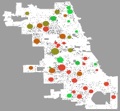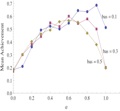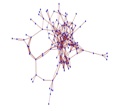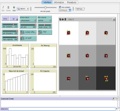Research
My research addresses the theoretical and methodological challenges involved with studying how social and economic systems change. I am especially interested in understanding the problem of “policy resistance” - why well-intentioned organizational and public policies often produce unanticipated responses by the systems they trying to improve. I view understanding the connection between individual and collective behavior as central to understanding policy resistance, and consequently use tools such as agent‐based modeling and social network analysis which foreground the interactions between individuals in a system.
You can find a brief articulation of the rationale for this research perspective here:
Maroulis, S., Guimera, R., Petry, H., Gomez, L., Amaral, L.A.N., Wilensky, U. (2010). “A Complex Systems View of Educational Policy.” Science. Vol. 330, Issue 6000.
Specific projects include investigating the barriers to innovation implementation in schools, estimating the effect of student social networks on academic performance, studying the dynamics of market-based reforms in education, and modeling the emergence of new norms and practices in professional communities. Pursuit of answers to substantive problems in these areas has also led to a methodological strand of research focused on quantifying the robustness of causal inferences.
Publications
Overton, M.O., Kleinschmit, S., Feeney, M., Fusi, F., Hart, N., Maroulis, S., Schwoerer, K., Stokan, E., Thomas, H. and Workman, S. (2023). “Administrative Informatics: A Roundtable on the Conceptual Foundations of a Public Administration-Centered Data Science Subfield.” Journal of Behavioral Public Administration, 6
Frank, K.A., Lin, Q., Maroulis, S., & Xu, R. (in press). “Quantifying the Robustness of Causal Inference: Sensitivity Analysis for Pragmatic Social Science.” Social Science Research
Canals, C., Maroulis, S., Canessa, E., Chaigneau, S. & Mizala, A. (2023). "Mechanisms underlying choice-set formation: The case of school choice in Chile.” Social Science Computer Review 41(5), 1877-1901
Zhang, F & Maroulis, S. (2021). "Experience is not enough: A dynamic explanation of the limited adaptation to extreme weather events in public organizations.” Global Environmental Change 70, 102358
Frank K.A.*, Lin Q.*, Maroulis, S.*, Mueller AS, Xu R, Rosenberg JM, Hayter CS, Mahmoud RA, Kolak M, Dietz T, & Zhang L. (2021). “Hypothetical case replacement can be used to quantify the robustness of trial results.” Journal of Clinical Epidemiology 61, 67-77
*equal co-authors
Maroulis, S. Diermeier, D. & Nisar, M.A. (2020). “Discovery, dissemination, and information diversity in networked groups.” Social Networks 61, 67-77
Maroulis, S., Santillano, R., Jabbar, H., & Harris, D. N. (2019). “The push and pull of school performance: Evidence from student mobility in New Orleans.” American Journal of Education 125 (3)
Xu, R., Frank, K. A., Maroulis, S. J., & Rosenberg, J. M. (2019). “konfound: Command to quantify robustness of causal inferences.” The Stata Journal
Healy, R., & Maroulis, S. (2019). “Business and political process reform: Ignore or engage? ” Society and Business Review 14 (3)
Maroulis, S. (2019). Book Review of Marie Lowman, ed., A Practical Guide to Analytics for Governments: Using Big Data for Good (Hoboken, NJ: Wiley and Sons, 2017) Public Administration Review 79 (5)
Nisar, M.A. & Maroulis, S. (2017). “Foundations Of Relating:? Theory And Evidence On The Formation Of Street-Level Bureaucrats' Workplace Networks.” Public Administration Review doi:10.1111/puar.12719
Maroulis, S. (2017). “The Role of Network Structure in Street-Level Innovation.” American Review of Public Administration 47(4) doi: 10.1177/0275074015611745
Maroulis, S. (2016). “Interpreting School Choice Treatment Effects: Results and Implications from Computational Experiments.” Journal of Artificial Societies and Social Simulation 19(1) 7
*Sirer, M.I., & *Maroulis, S.,Guimera, R., Wilensky, U., Amaral, L.A.N. (2015). “The Currents Beneath the 'Rising Tide' of School Choice: An Analysis of Student Enrollment Flows in the Chicago Public Schools” Journal of Policy Analysis and Management 34 (2)
*equal co-authors
Maroulis, S., & Wilensky, U. (2015). “Social and Task Interdependencies in the Street-Level Implementation of Innovation.” Journal of Public Administration Research and Theory 25 (3) doi: 10.1093/jopart/mut084
*Colyvas, J.A., & *Maroulis, S. (2015). “Moving from an Exception to a Rule: Analyzing Mechanisms in Emergence-Based Institutionalization.” Organization Science 26 (2)
*equal co-authors
Kim, Y. & Maroulis, S. (2015). “Rethinking Social Welfare Fraud from a Complex Adaptive Systems Perspective..” Administration & Society doi: 10.1177/0095399715587520
Maroulis, S., Bakshy, E., Gomez, L., & Wilensky, U. (2014). “Modeling the Transition to Public School Choice.” Journal of Artificial Societies and Social Simulation 17 (2)
Frank, K., Maroulis, S., Duong, M., & Kelcey, B. (2013).
“What Would It Take to Change an Inference? Using Rubin’s Causal Model to Interpret the Robustness of Causal Inferences.”Educational Evaluation and Policy Analysis 35 (4): 437-460.
Colyvas, J.A. & Maroulis, S. (2013). “Academic Laboratories and the Reproduction of Proprietary Science: Modeling Organizational Rules through Autocatalytic Networks.” In Padgett, J. and Powell, W.W. (eds.), The Emergence of Organizations and Markets.
Frank, K., Maroulis, S., Belman, D., & Kaplowitz, M. (2011). “The Social Embeddedness of Natural Resource Extraction and Use in Small Fishing Communities.” In Taylor, W. and Schechter, M. (eds.), Sustainable Fisheries: Multi-level Approaches to a Global Problem.
Maroulis, S., Guimera, R., Petry, H., Gomez, L., Amaral, L.A.N., Wilensky, U. (2010). “A Complex Systems View of Educational Policy.” Science. Vol. 330, Issue 6000.
Maroulis, S. & Gomez, L. (2008). ”Does ‘Connectedness’ Matter? Evidence from a Social Network Analysis within a Small School Reform.”
Teachers College Record, Vol. 110, Issue 9.
Reiter, S. & Maroulis, S. (2008). ”Stable Processes of Exchange.” Journal of Mathematical Economics, Vol. 44, Issue 12, pp. 1398-1412.
Patents
“Board Game for Teaching Project Management Skills.” US Patent #6237915 B1. Issued May 29, 2001




